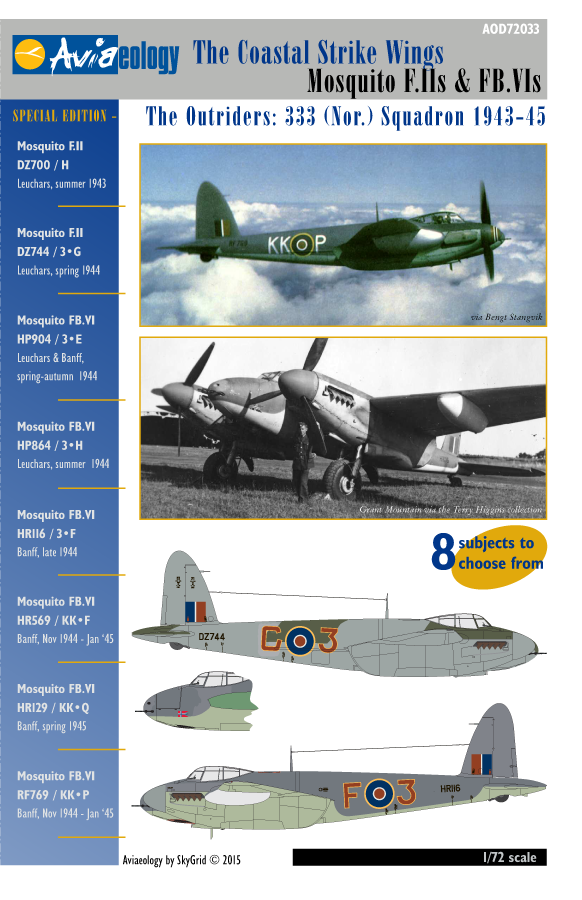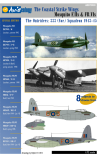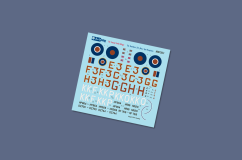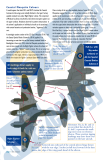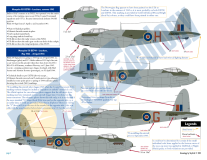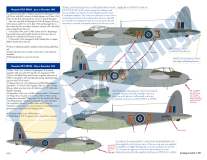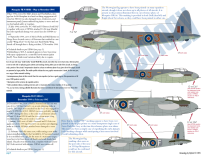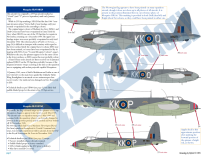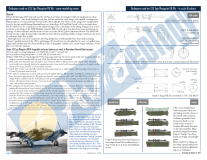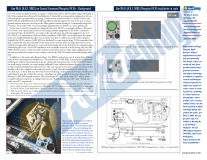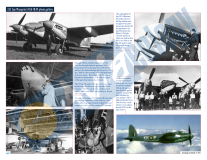- Aviaeology Shop
- >
- Decal Sets
- >
- Decals 'n Docs
- >
- 1/72 scale Decals 'n Docs
- >
- Strike Wing Outriders – 333 (Norwegian) Sqn Mosquitoes
Strike Wing Outriders – 333 (Norwegian) Sqn Mosquitoes
SKU:
CA$11.49
11.49
13.89
CA$11.49 - CA$13.89
Unavailable
per item
• Decals to model any one of eight different aircraft. Features two variations of the Norwegian flag nose markings all common markings, including both pre and post January 1945 upper wing roundels.
• Eight 8.5 x 11in. pages of illustrated documentation.*
Available with or without airframe stencil data markings set AOD72s05in the same package.
Sold out
Aircraft covered in this set:
• Mosquito F.II DZ700 as aircraft H of 333 (Norwegian) Squadron, RAF Coastal Command, Leuchars, spring and summer 1943.
One of Coastal Command's earliest Mosquitoes, it survived the war.
• Mosquito F.II DZ744 as aircraft G of 333 (Norwegian) Squadron, RAF Coastal Command, Leuchars, May 1943 to April 1944 (two markings variations provided – see image gallery for details).
Lt. Skavhaugen (pilot) and Petty Officer Heide achieved 333 Sqn’s first air-to-air victory in this aircraft when they shot down a Dornier Do 24 off Karmøy, southern Norway, on 13 June 1943.
• Mosquito FB.VI HP864 as aircraft 3•H of 333 (Norwegian) Squadron, RAF Coastal Command. Operated in 18 Group from Leuchars, and Banff, Scotland between June 1944 and December 1944.
Lt. Johansen and SubLt. Hulmen attacked and damaged U-290 off Utvær with machine gun, cannon, & depth charges (D/Cs) on 14 June 1944. This was the first operational use of a D/C armed Mosquito.
This same crew also attacked and damaged U-998 off Bergen, Norway, with cannon and D/Cs on 16 June 1944. The attack damaged her to the extent that she was written off by late July, and scrapped later that year.
• Mosquito FB.VI HP904 as aircraft 3•E of 333 (Norwegian) Squadron, RAF Coastal Command. Operated in 18 Group from Leuchars, and Banff, Scotland between May 1944 and December 1944.
This aircraft was involved in a number of notable actions:
– SubLts Engebrigtsen & Jonassen, together with one other 333 Sqn Mossie, damaged U-958 on 26 May 1944.
– Mids Breck and Hjorten attacked and damaged U-244 off Mandal, Norway on 25 July 1944.
– Lt Jørgensen and Mid Helgedagsrud attacked U-771 and U-1163 on 2 August 1944.
• Mosquito FB.VI HR116 as aircraft 3•F of 333 (Norwegian) Squadron, RAF Coastal Command. Operated in 18 Group from Leuchars, and Banff, Scotland between May 1944 and November 1944.
This aircraft was involved in several of notable actions:
– Mids Jensen and Thorkildsen, damaged an Ar196 floatplane during a head-on firing engagement off Lista on 8 May 1944. HR116 also sustained damage in nose and cockpit, and the pilot was injured but returned safely to base.
– P/O Stiff and FS Bussey (both RAF ), together with Mosquito HP904, attacked U-244 near Mandal.
• Mosquito FB.VI HR569 as aircraft KK•F of 333 (Norwegian) Squadron, RAF Coastal Command. Operated in 18 Group from Banff, Scotland between December 1944 and February 1945.
Option of using earlier 3•F markings and type B upper wing roundels, or 1945 era equivalents possible for this aircraft.
– Flown on Outrider sorties by the crew of SubLt Stensrud and FS Friis, who were part of a strike formation that was intercepted by Fw 190s on 26 December 1944.
– With this same crew, HR569 was written off in a crash landing after hitting a ship's mast while testing a new strike camera installation on 22 February 1945.
• Mosquito FB.VI HR129 as aircraft KK•Q of 333 (Norwegian) Squadron, RAF Coastal Command. Operated in 18 Group from Banff, Scotland, from early-mid January 1945.
– Flown by the crew of SubLt's Mathiesen and Leithe as one of two Outriders to the main force, guiding Dallachy Strike Wing Beaufighters in an attack on two minesweeper-class escort vessels on 11 January 1945. One was sunk and the other damaged during this attack
• Mosquito FB.VI RF769 as aircraft KK•P of 333 (Norwegian) Squadron, RAF Coastal Command. Operated in 18 Group from Banff, Scotland in May 1945.
With the squadron in the final month of the European war. Crashed around the time the squadron was being formally transferred from the Norwegian Marinens Flyvevåpen (Naval Air Arm) within the RAF, to the Royal Norwegian Air Force in the last days of November 1945.
*High resolution b&w copy of Docs supplied in the package. Home-printable colour PDF version available via email after purchase.
The richly detailed Docs file – the Aviaeology "magazine article in a decal bag" you may have heard about – is also available separately as a PDF e-publication that you can use to zoom in to high magnification on-screen, or print out in colour. Internet-connected registered owners of the decal set get the docs for free.
Additional material in this particular set's Docs includes a full-page illustrated article detailing, in notes and scale drawings, the external under-wing ordnance and bomb bay ordnance carried on several types of Coastal Command missions, including 500 lb MC bombs, 250 lb Mk.XI Depth Charges, and the rare 500 lb Mine "A" Mk.VIII; similar full-page illustrated coverage of the Gee Mk.II Airborne Radio Installation (ARI 5083) installation used in all of the FB.VIs covered in this set and a useful reference photo page.
Additional technical / equipment notes specific to each individual aircraft are laced throughout the comprehensive decal placement and painting instructions, covering all subject aircraft variations.
A separate general decal preparation / application instruction sheet completes the package.
• Mosquito F.II DZ700 as aircraft H of 333 (Norwegian) Squadron, RAF Coastal Command, Leuchars, spring and summer 1943.
One of Coastal Command's earliest Mosquitoes, it survived the war.
• Mosquito F.II DZ744 as aircraft G of 333 (Norwegian) Squadron, RAF Coastal Command, Leuchars, May 1943 to April 1944 (two markings variations provided – see image gallery for details).
Lt. Skavhaugen (pilot) and Petty Officer Heide achieved 333 Sqn’s first air-to-air victory in this aircraft when they shot down a Dornier Do 24 off Karmøy, southern Norway, on 13 June 1943.
• Mosquito FB.VI HP864 as aircraft 3•H of 333 (Norwegian) Squadron, RAF Coastal Command. Operated in 18 Group from Leuchars, and Banff, Scotland between June 1944 and December 1944.
Lt. Johansen and SubLt. Hulmen attacked and damaged U-290 off Utvær with machine gun, cannon, & depth charges (D/Cs) on 14 June 1944. This was the first operational use of a D/C armed Mosquito.
This same crew also attacked and damaged U-998 off Bergen, Norway, with cannon and D/Cs on 16 June 1944. The attack damaged her to the extent that she was written off by late July, and scrapped later that year.
• Mosquito FB.VI HP904 as aircraft 3•E of 333 (Norwegian) Squadron, RAF Coastal Command. Operated in 18 Group from Leuchars, and Banff, Scotland between May 1944 and December 1944.
This aircraft was involved in a number of notable actions:
– SubLts Engebrigtsen & Jonassen, together with one other 333 Sqn Mossie, damaged U-958 on 26 May 1944.
– Mids Breck and Hjorten attacked and damaged U-244 off Mandal, Norway on 25 July 1944.
– Lt Jørgensen and Mid Helgedagsrud attacked U-771 and U-1163 on 2 August 1944.
• Mosquito FB.VI HR116 as aircraft 3•F of 333 (Norwegian) Squadron, RAF Coastal Command. Operated in 18 Group from Leuchars, and Banff, Scotland between May 1944 and November 1944.
This aircraft was involved in several of notable actions:
– Mids Jensen and Thorkildsen, damaged an Ar196 floatplane during a head-on firing engagement off Lista on 8 May 1944. HR116 also sustained damage in nose and cockpit, and the pilot was injured but returned safely to base.
– P/O Stiff and FS Bussey (both RAF ), together with Mosquito HP904, attacked U-244 near Mandal.
• Mosquito FB.VI HR569 as aircraft KK•F of 333 (Norwegian) Squadron, RAF Coastal Command. Operated in 18 Group from Banff, Scotland between December 1944 and February 1945.
Option of using earlier 3•F markings and type B upper wing roundels, or 1945 era equivalents possible for this aircraft.
– Flown on Outrider sorties by the crew of SubLt Stensrud and FS Friis, who were part of a strike formation that was intercepted by Fw 190s on 26 December 1944.
– With this same crew, HR569 was written off in a crash landing after hitting a ship's mast while testing a new strike camera installation on 22 February 1945.
• Mosquito FB.VI HR129 as aircraft KK•Q of 333 (Norwegian) Squadron, RAF Coastal Command. Operated in 18 Group from Banff, Scotland, from early-mid January 1945.
– Flown by the crew of SubLt's Mathiesen and Leithe as one of two Outriders to the main force, guiding Dallachy Strike Wing Beaufighters in an attack on two minesweeper-class escort vessels on 11 January 1945. One was sunk and the other damaged during this attack
• Mosquito FB.VI RF769 as aircraft KK•P of 333 (Norwegian) Squadron, RAF Coastal Command. Operated in 18 Group from Banff, Scotland in May 1945.
With the squadron in the final month of the European war. Crashed around the time the squadron was being formally transferred from the Norwegian Marinens Flyvevåpen (Naval Air Arm) within the RAF, to the Royal Norwegian Air Force in the last days of November 1945.
*High resolution b&w copy of Docs supplied in the package. Home-printable colour PDF version available via email after purchase.
The richly detailed Docs file – the Aviaeology "magazine article in a decal bag" you may have heard about – is also available separately as a PDF e-publication that you can use to zoom in to high magnification on-screen, or print out in colour. Internet-connected registered owners of the decal set get the docs for free.
Additional material in this particular set's Docs includes a full-page illustrated article detailing, in notes and scale drawings, the external under-wing ordnance and bomb bay ordnance carried on several types of Coastal Command missions, including 500 lb MC bombs, 250 lb Mk.XI Depth Charges, and the rare 500 lb Mine "A" Mk.VIII; similar full-page illustrated coverage of the Gee Mk.II Airborne Radio Installation (ARI 5083) installation used in all of the FB.VIs covered in this set and a useful reference photo page.
Additional technical / equipment notes specific to each individual aircraft are laced throughout the comprehensive decal placement and painting instructions, covering all subject aircraft variations.
A separate general decal preparation / application instruction sheet completes the package.

